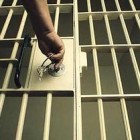
Locking up Kids who Have Committed no Crime Could Cost Georgia Millions in Federal Funds
|
Every week, Georgia locks up juveniles who've committed no crime. A new study contends Georgia risks losing millions of dollars in federal funding if it continues doing so at the current rate. They are runaways, truants, curfew violators, underage smokers and drinkers. They're called status offenders because their actions are only an issue due to their status as juveniles; if an adult did the same thing, it wouldn't be a crime. Now, a report commissioned by the Governor's Office for Children and Families warns that the practice could cost the state about $2 million a year in federal funding, particularly if Congress follows through with plans to tighten guidelines for placing status offenders in secure detention.






